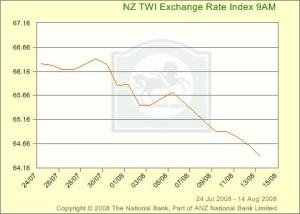New Zealand dollar in decline
Source (NBNZ)
Damn, I wish I had picked up this graph yesterday – as the 24 July was when the RBNZ cut the OCR, which made the TWI fall by about 100 basis points.
So since then, our exchange rate has slide a further 200 basis points. For people that prefer thinking of it in US$ terms, we have fallen from $0.77US per NZ$ to $0.70 (including a little time under $0.69US!)
Why the hell is this happening?
Update: The rebound in the dollar was bound to happen this morning following this post and the fact that other commentators have said the dollar would keep falling – it is the “curse of the forecast” after all 😛 – luckily the below discussion is about the general factors driving a decline, rather than a next day forecast 😉

